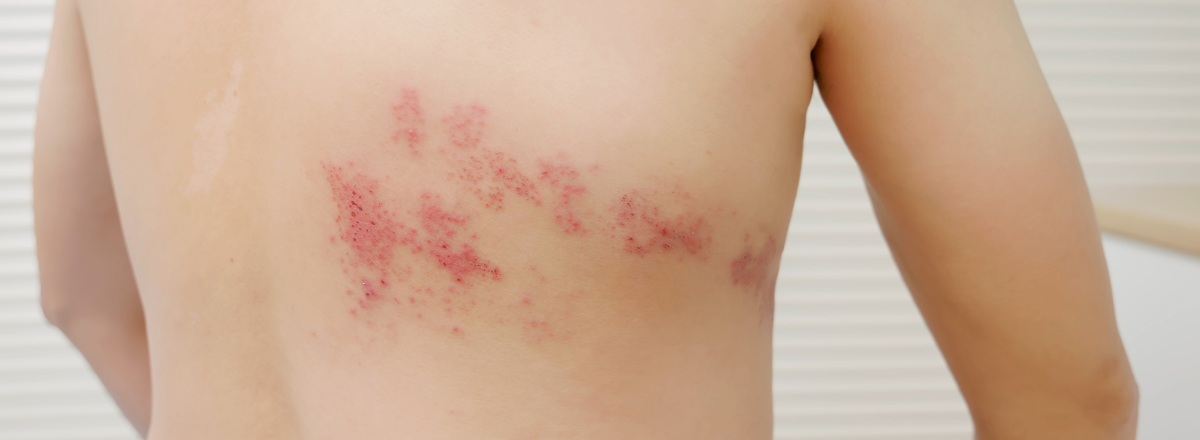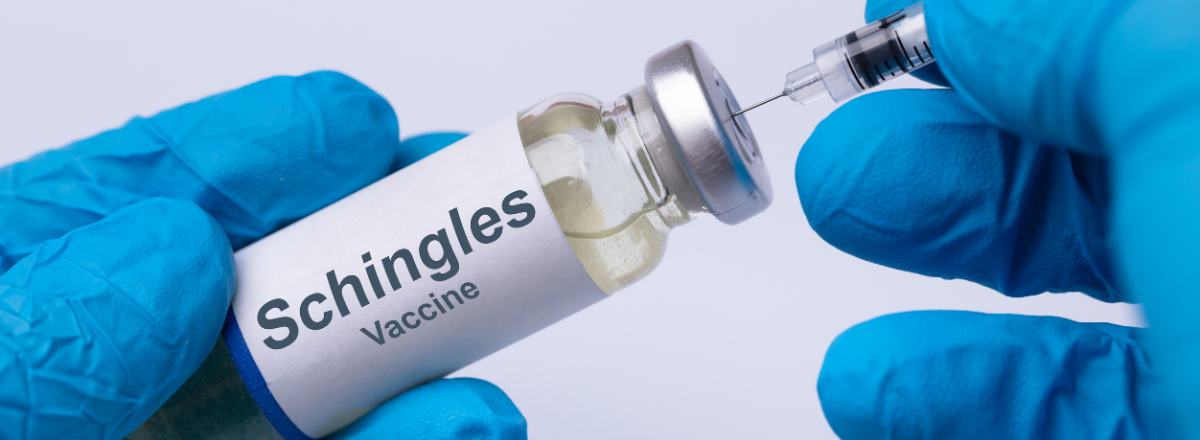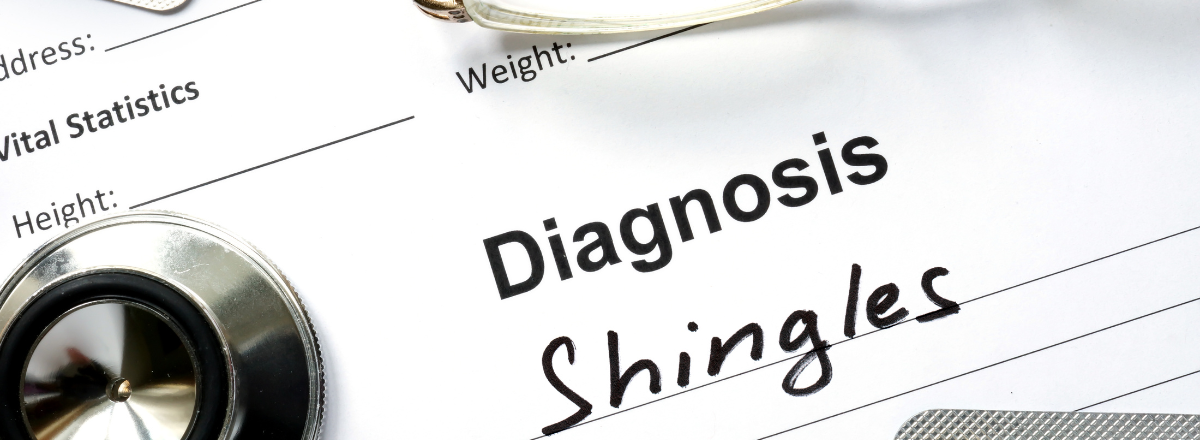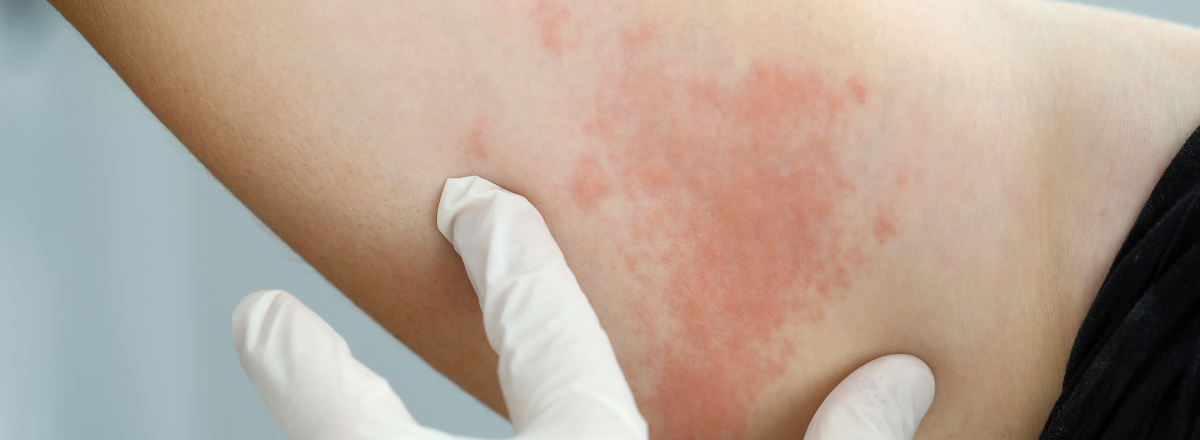From September, over a million more people will be eligible for a shingles vaccine. But what even is shingles and how worried should you be about it? ZoomDoc Chief Medical Officer and GP, Dr Kenny Livingstone, explains.
What is shingles?

The first signs of shingles can be: a tingling or painful feeling in an area of skin; a headache or feeling generally unwell.
Shingles is linked to the chickenpox virus (the varicella-zoster virus), which most of us catch as a child. Although we recover fairly quickly, the virus actually stays dormant in the body and usually does no harm.
However, if you are particularly stressed or have a low immune system, the virus can be reactivated as something called shingles – an unpleasant and painful condition that tends to affect older people.
Around 1 in 4 people who’ve had chickenpox in childhood will go on and develop shingles in older age. (Source: NHS)
What are the symptoms of shingles?
Although caused by the chickenpox virus, the symptoms of shingles are different to chickenpox, which is recognisable by itchy blisters that crust over within about a week or so.
Shingles often starts with:
- a tingling or painful feeling in an area of skin
- a headache or feeling generally unwell
Then a rash will appear a few days later. This is usually:
- on one side of your body only
- blotchy, scaly and sore
- patchy with itchy blisters forming in clusters
The rash can be in or around one eye, sometimes making it hard to see or hear. If left untreated it can even cause blindness.
Can you get chickenpox from shingles, or shingles from chickenpox?
This is often a concern when someone you know comes down with shingles. Particularly if it’s a grandparent around young children, or vice-versa.
Here’s how it works:
Once you’ve had chickenpox, it’s very unlikely you’ll get it again. However, if you’ve never had it then it is possible to get chickenpox from someone who has shingles.
It is not possible to get shingles from someone with shingles.
It is also not possible to get shingles from someone with chickenpox!
When to see a doctor with shingles
If you think you have or know you have shingles, call your GP as soon as possible. If the shingles rash is around your eye, or painful then you’ll need a course of antiviral medication, such as aciclovir (Zovirax), or alternatives.
Shingles can take several weeks to get better and even once the rash disappears, the pain of it can linger. This is called postherpetic neuralgia and can be incredibly painful and debilitating, much like a repetitive stabbing pain.
ZoomDoc GPs are also available for support or prescriptions, so download our app to speak to a doctor at a time to suit you.
How do I get a shingles vaccine?

A vaccine to prevent shingles, a common, painful skin disease, is available on the NHS to people in their 70s.
Until now the vaccine for shingles has been available on the NHS for over 70s. However, from this September (2023) it will also be made available to those 65 and over.
Anyone who’s over the age of 50 will also be eligible for the vaccine if they’re severely immunosuppressed. Anyone who’s eligible will be contacted by their GP practice this autumn.
The age-range for eligibility will be lowered to 60+ over the next decade.
Dr Mary Ramsay, Director of Immunisation at the UK Health Security Agency (UKHSA) is urging people to take up the vaccine invitation when it comes.
She said:
‘A newly available vaccine, Shingrix, is being offered on the NHS from September to those aged 65 and 70 years, and to those with severely weakened immune systems from 50 years of age.
‘Two doses of vaccine are highly effective in reducing your risk of getting shingles, or if you do develop shingles, reduce the severity of your symptoms. I strongly urge all those eligible to protect themselves by taking up the offer of a vaccine when they are contacted by their GP.’
Make sure you’re up to date with your vaccines.
Can you fly with shingles?

it’s usually fine to travel with shingles as long as your doctor passes you as fit to fly and you meet the requirements of your airline.
With chickenpox you cannot fly until the spots have all crusted over.
Read more on flying with chickenpox and other conditions.
However, if you are well enough, you can still fly with shingles. Of course, if you have a visible rash or any doubts it’s a good idea to get a Fit-To-Fly Certificate from your doctor, for the airline and your own peace of mind.
To take the stress out of this, simply order yours directly from ZoomDoc. We’ll be able to assess your shingles status and, provided you are well enough to travel, will provide a certificate confirming this. There’s no need to see your GP for this. Order it here and you can get it the same day for just £40.
Alternatively, if shingles means you’re not well enough to travel, we can also provide a Travel and Holiday Cancellation Certificate for travel insurance claims. It costs just £40 and again saves you a trip to the GP practice as well as a second trip at a later date to collect the letter and pay for it (as this counts as a non-NHS service and therefore you will be charged for it.)


